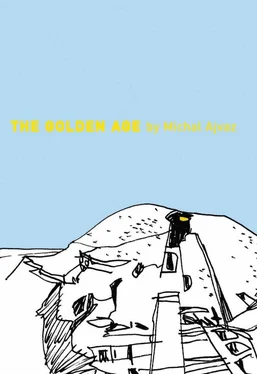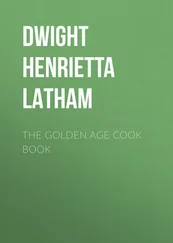Michal Ajvaz - The Golden Age
Здесь есть возможность читать онлайн «Michal Ajvaz - The Golden Age» весь текст электронной книги совершенно бесплатно (целиком полную версию без сокращений). В некоторых случаях можно слушать аудио, скачать через торрент в формате fb2 и присутствует краткое содержание. Год выпуска: 2010, Издательство: Dalkey Archive Press, Жанр: Современная проза, на английском языке. Описание произведения, (предисловие) а так же отзывы посетителей доступны на портале библиотеки ЛибКат.
- Название:The Golden Age
- Автор:
- Издательство:Dalkey Archive Press
- Жанр:
- Год:2010
- ISBN:нет данных
- Рейтинг книги:4 / 5. Голосов: 1
-
Избранное:Добавить в избранное
- Отзывы:
-
Ваша оценка:
- 80
- 1
- 2
- 3
- 4
- 5
The Golden Age: краткое содержание, описание и аннотация
Предлагаем к чтению аннотацию, описание, краткое содержание или предисловие (зависит от того, что написал сам автор книги «The Golden Age»). Если вы не нашли необходимую информацию о книге — напишите в комментариях, мы постараемся отыскать её.
is Michal Ajvaz’s greatest and most ambitious work.
The Golden Age
The Golden Age — читать онлайн бесплатно полную книгу (весь текст) целиком
Ниже представлен текст книги, разбитый по страницам. Система сохранения места последней прочитанной страницы, позволяет с удобством читать онлайн бесплатно книгу «The Golden Age», без необходимости каждый раз заново искать на чём Вы остановились. Поставьте закладку, и сможете в любой момент перейти на страницу, на которой закончили чтение.
Интервал:
Закладка:
I believe that the new religion changed after the prophet’s death. It rid itself of some of its more eccentric features and drew nearer to other religions. That it developed some kind of notion of an afterlife is testified to in Averroes’s tractate, in which the thinker from Cordoba rejects the notion of the immortality of the individual soul, employing in his polemic an anecdote from the island as a kind of reductio ad absurdum . This is the tale Averroes tells: the prophet of the island of Phoenix pays a visit to his neighbour, arriving as the latter is about to whitewash his home. The prophet bursts into tears and pleads with his neighbour to abandon this course of action. When the astonished neighbour asks what it is about the painting of his home that so troubles the prophet, the latter points to a dried stain on the wall and says: “I see in that the face of my late father. I visit you only in order to be closer to him, so that my father may see me and hear my voice. Were you to paint over him, his soul would wander the atmosphere in confusion, looking for another stain to inhabit. Perhaps it would be forced to settle in a place that would bring it great indignity, perhaps on a wall at the other end of the world, so we should never see each other again.”
Averroes writes that the islanders believe that the souls of the dead live on in stains on walls, that they prove this by a curious concatenation of evidence: souls are incorporeal so they must dwell in something with a material volume; volume lacks a two-dimensional form, and as stains on walls are two-dimensional, souls undoubtedly reside in stains. Perhaps the islanders themselves were not altogether convinced of the logic of this, so as a second proof of life after death in stains, they declared that in the half-light we often have the impression we see the outline of a person or an animal.
This story may be based in truth, although plainly it is paraphrasing what Diogenes Laertius tells of Pythagoras (fragment B7 in Diels). It was not so far from Cordoba to the island, and before the original communication was changed into an anecdote and before this anecdote was heard by Averroes, it must have passed through many mouths. I can well imagine the impact the imaginations of sailors and merchants steeped in tales from the Orient would have worked on it.
Names of stains
When the prophet — an exemplar of courage who invested the glowing, nonsensical world with murmurs and stains — no longer walked among them, the islanders became uncertain of the way and began to look around for translators and interpreters. Now they needed a grammar and a lexicon of stains, so that they might understand their language. At that time catalogues and dictionaries of stains came into being. We see the transitions as indistinguishable from one another, but to the islanders they are full of similarities and differences. Stains came to be classified, and the various types were given names to which fixed meanings were attached. It seems that in the old days the attitudes of the islanders to stains were personal — some of them one loved, others one hated. These attitudes were subject to sudden, fleeting fashions; sometimes a marginal stain that no one had paid any attention to would appear overnight on all walls and garments and would suddenly adorn the surfaces of dozens of objects. Of course, the Stain of Awakening still held a privileged and unshakable position, and the shape made by the sauce on the page of the sacred book was carved in stone, set in bright-coloured gemstones and tattooed on skin.
At that time the islanders would walk about with dictionaries in their hands, employing them in the reading of stain texts and any other shapes they happened upon. One Arabian merchant tells the tale of how he arrives at the home of one of the islanders for a business appointment. He finds the islander in the yard of his dwelling, watching with excitement a bedsheet that is flapping and swelling in the strong wind as it dries on a washing-line; also he keeps looking in a thick dictionary he is holding in his hand. The islander asks the merchant to wait a few moments. Once the wind calms down, he makes his apologies: the story written in the sheet was an exciting one, and he wished to find out how it ended. When the merchant expresses his surprise at this, the islander explains that his countrymen regularly read the shapes that gather in pieces of cloth in windy weather; like hieroglyphs, he says, they create a continuous text.
I do not know how long this phase of the islanders’ religion lasted, but I believe that over time they ceased to perceive stains as communications from god. The changes occurring, the shapes, the stains became for them a game that had no connection to anything in particular. At around this time they laid aside their lexicons and grammars and ceased to ascribe to stains any fixed meanings. But the stains did not fall mute; they returned to their original voice, their blissful, meaningless murmuring. In this way the end of the religion was a triumph, a return to the beginning. Some travellers have written of the islanders with scorn or indignation; in their opinion, the veneration of the god of stains, which it was to be hoped still lingered in the islanders’ consciousness, was at least a form of prayer, and thus an attempt — albeit a dark and confused one — to make contact with God; they consider today’s total absence of any sense of transcendence as degeneracy of the severest kind. I feel I have neither the authority nor the need to reproach or praise the islanders for their godlessness, but I must say in their defence that much of what has been written about them is baseless slander: the atheism of the islanders has a special mystique based in its superficiality and immediacy, and it creates a space in which fine, almost noble gestures can develop. This hope-free, fear-free, sense-free space is often lit by a silent joy of the kind I have rarely experienced in Europe, and the shapes of stains and objects glow with a clear light. I learned that the islanders knew neither passion nor genuine cordiality, but in their behaviour there was always a tone in which discretion and noble tact were present. It seemed to me that out of this tone there might grow a kindness that would protect the maturing contours of things, a kindness that would be stronger than the kindness we know, because there would be no need for it to take into account sense and order, which always lead to violence and malevolence.
It is true that during my stay on the island I never met anyone who gave the impression that he was approaching such a transformation. For this to happen, it would perhaps be necessary for the seeds of future kindness to be nourished on realities other than the island’s anaesthetic murmurs and glimmers, the monotonous fraying and entwining of its currents, the slow melting of the solid and the crystallization of the liquid. It is possible that such a transformation will never come to pass, that what appeared to me as the seeds of a new world was really an afterglow projected by the past, that the islanders already have behind them their better days, their era of kindness and goodness, and that all that remains of it is the dubious virtue of discretion, in which tact comes together with indifference.
I once mentioned to Karael that it seemed to me that island life was heading for transformation, but my girlfriend disliked visions in which developments moved towards aims. I said nothing to contradict her; I didn’t have the right. There was only one person I could ask for help in the attempt to realize by alchemy a change in the islanders’ indifference, and naturally that person was me. I made an effort at it after I returned from the island, but the alchemy slipped from my fingers just as it did from those of the sorcerer’s apprentice: the result was a centaur with a human body and a horse’s head, mixed from the island’s distaste for large buildings, devoid of the island’s lightness and joy, with the European need for sense robbed of the ground beneath its feet that connects it firmly to our world.
Читать дальшеИнтервал:
Закладка:
Похожие книги на «The Golden Age»
Представляем Вашему вниманию похожие книги на «The Golden Age» списком для выбора. Мы отобрали схожую по названию и смыслу литературу в надежде предоставить читателям больше вариантов отыскать новые, интересные, ещё непрочитанные произведения.
Обсуждение, отзывы о книге «The Golden Age» и просто собственные мнения читателей. Оставьте ваши комментарии, напишите, что Вы думаете о произведении, его смысле или главных героях. Укажите что конкретно понравилось, а что нет, и почему Вы так считаете.












